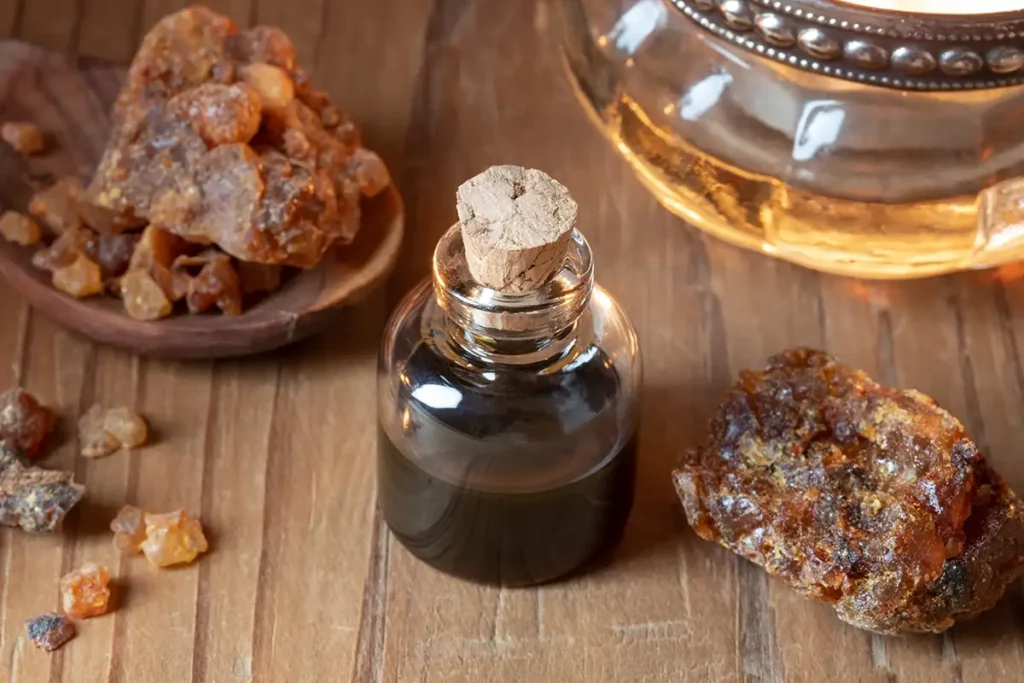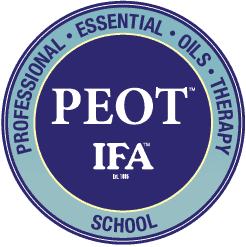Welcome to the wonderful world of Myrrh essential oil!
Long known for its wonderful health benefits for the skin and its calming aromatherapy effects, Myrrh oil is a must-have for any aromatherapy enthusiast. This ancient oil has been used for centuries for its wound healing and soothing properties, making it a natural remedy for skin and relaxation. In this blog post, we will explore Myrrh oil uses and how you can use it for aromatherapy.
So, let’s get started and discover all the wonderful things Myrrh oil can do for you!
An Overview of Myrrh Essential Oil
What is Myrrh?
The word Myrrh comes from an Arabic word (murr), which translates as “bitter”. Myrrh trees have been cultivated for centuries, and the Ancient Greeks issued the resin to soldiers to use in healing salves to treat wounds from battle. Burning myrrh resin was also a standard part of religious rituals, so it was embedded into daily life.
What is Myrrh Essential Oil?
The primary use of Myrrh oil has been for its therapeutic properties. In Traditional Chinese Medicine, it is used to keep the blood moving for circulation and arthritic problems.
Myrrh oil has been found to inhibit the growth of fungal infections such as athlete’s foot by up to 50%. If the skin is badly damaged, just a few drops of Myrrh essential oil applied topically in a carrier oil can help to increase the white blood cells around the damaged area, which increases the speed of healing. This is enhanced even further by blending Myrrh oil with Tea Tree oil.
Myrrh oil also helps when coping with pain, giving some relief because it is known to block some of the inflammatory chemicals that cause swelling, pressure and pain. Understandably, many health professionals recognise how effective this can be with inflammatory conditions like arthritis.
How is Myrrh Oil Extracted?
Myrrh trees are native to India, the Middle East and Africa and are classified as Commiphora Myrrha. They are quite small, shrubby trees, and they were first mentioned in the Bible.
Myrrh gum is extracted from the Myrrh tree by repeatedly cutting incisions into the tree to cause the Myrrh tree to exude a sap-like substance. It is very thick and sticky, but it hardens up quite quickly. Initially, the resin is clear to an opaque yellow, but the colour darkens as it ages.
The steam distillation process begins with the collection of resin-rich pieces of Myrrh (the plant from which it’s derived). After being chopped up into small pieces and dried, these are placed in a still or distillation apparatus. Steam passes through the pieces of resin, causing the oils to vaporise and evaporate while water condenses on the walls of the still. As it cools down again, any remaining oil droplets are separated from the water by decanting or filtering techniques before being collected.
It is also possible that the Myrrh oil has been isolated with solvent extraction. Both steam distillation and solvent extraction are suitable methods, but it is important that you know which type of extraction you have, so check the paperwork that goes with the oil.
The resulting Myrrh oil is thick, sticky, and dark brown. It has a warm, woody aroma and an aromatic, slightly medicinal, pungent note.
The History of Myrrh Essential Oil Usage
There are numerous historical records of Myrrh oil uses. Myrrh essential oil is also known to have spiritual and religious significance, particularly in Christianity and Judaism. It is said to have purifying qualities and is often used in religious ceremonies and rituals.
The ancient Egyptians regarded Myrrh Oil as one of the most sacred gifts for their gods. It was used to promote physical and spiritual health and was even believed to have protective powers against evil spirits. Myrrh Oil was also used during mummification rituals because it helped preserve the body by warding off bacteria and reducing odour.
In traditional medicine, Myrrh essential oil is still widely used today to reduce inflammation or as an antiseptic to treat skin wounds and skin ailments such as eczema and psoriasis.
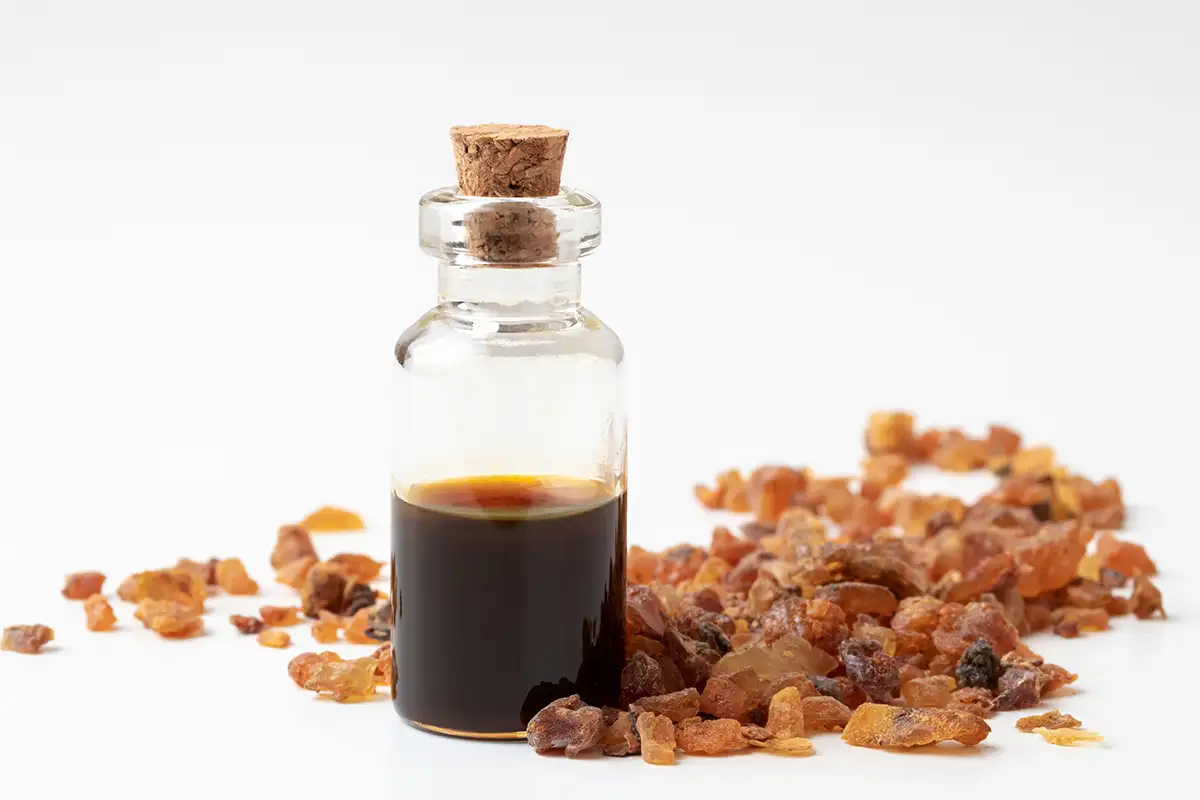
Health Benefits of Myrrh Essential Oils
Its antioxidant and moisturising properties make it good for healthy skin
Myrrh oil is a powerful antioxidant; this is good news for your skin! It slows free radical activity, which causes wrinkles and signs of ageing. Using Myrrh oil in a cream moisturiser or serum will rejuvenate your skin. It potentially stimulates cellular regeneration and is a great tonic for tired and ageing skin.
It is also a first-class ingredient to add to foot creams and gels, as it is also antifungal and strongly antiseptic. If you already have athlete’s foot, consult your professional essential oil therapist (PEOT), who can blend up a remedy of Myrrh oil with some Tea Tree oil into a carrier oil to apply between the toes. Once the skin has cleared up, you can use an aromatherapeutic Myrrh oil gel for daily maintenance.
The soothing benefits of Myrrh essential oil are commonly used in aromatherapy
An aromatherapy massage is a luxury that many of us cannot always indulge in. If you can, make up your own massage oil blend with Myrrh oil, Lavender essential oil and a few drops of Patchouli essential oil. Seek professional advice if you are not qualified in essential oil blending. This magical blend will lift the tensions away from you, relax your muscles and allow you to be nurtured and cared for. Myrrh has a warm, balsamic sweetness to it that is warm, rich and indulgent. Even though it is a massage blend, you also breathe this, allowing you to relax even further.
If you can’t get a massage, you can use the same blend in the bath. Mix an egg cup full of mild bubble bath with an egg cup full of massage oil. Swirl it through the bath water, get in and relax. There is no need to shower afterwards; get and wrap yourself up in a towel or dressing gown. Remember to wash out the bath afterwards as it will have a trace amount of oil, which could be slippery for the next person.
If you don’t have a bath, apply some of the massage oil after a shower. It is important that you allow time to look after yourself!
Another form of aromatherapy is to use an oil diffuser. Myrrh essential oil can create a peaceful, calming atmosphere that will help reduce stress, promote relaxation, and even help treat insomnia.
It has anti-inflammatory properties
Myrrh oil has strong anti-inflammatory properties that are even stronger when combined with Frankincense essential oil. Studies have shown that inflammation is significantly reduced when this blend is applied. This is beneficial for anyone with joint pain or other inflammatory issues. More research is needed to gain more scientific evidence that can be used on a greater scale.
A few drops of Myrrh essential oil blended into a carrier oil can benefit eczema and psoriasis. The gentle analgesic action will soothe any itchiness, and its antimicrobial properties will address skin wounds.
It can be used as an antiseptic
Myrrh essential oil has a wide range of benefits for the skin and aromatherapy. Its antimicrobial and antiseptic qualities make it a great choice for skin care. It can help reduce inflammation and treat common skin conditions like acne. It helps to keep the spots clear of infection and encourages healing while reducing the chance of scarring.
It can support oral health and is effective in the treatment of mouth ulcers
Ingesting Myrrh oil is not recommended, although it is well-known that a few drops of myrrh oil can be used to help soothe mouth sores. Its antibacterial properties help to speed up wound healing with many forms of gum disease and mouth sores. There are a range of oral health products that contain Myrrh oil, such as toothpaste and natural Myrrh mouthwash, to help reduce plaque, and can also be used to help treat sore throats.
Myrrh can be effective in pain relief
So much of the pain associated with gout, rheumatism and arthritis is because of inflammation. Myrrh oil effectively reduces inflammatory chemicals and is also an effective analgesic. It’s an old remedy that has been used for thousands of years for joint pain, and ongoing research holds great promise for those looking for natural ways to manage inflammation and reduce pain.
Its antimicrobial, antifungal and antiseptic properties can help prevent infections
Adding a few drops of Myrrh oil to an electric diffuser will support the respiratory system by reducing mucous secretions. As an expectorant, it can help shift stubborn phlegm, promoting easier breathing. Being antiseptic, it can shorten the duration of minor coughs and colds and help with asthma and bronchitis. Please keep in mind that it is important to bring these issues to the attention of your medical health professional or doctor.
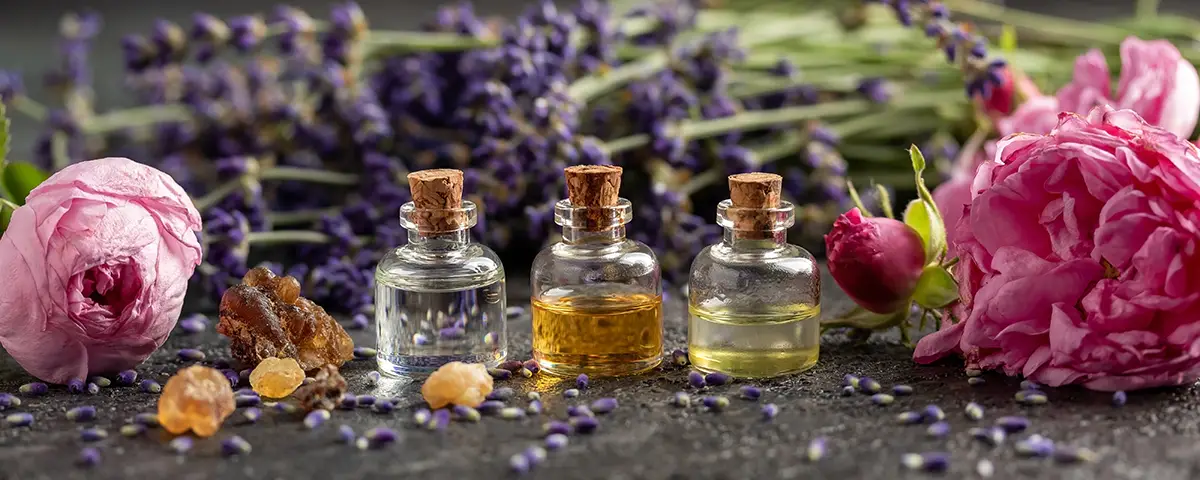
Frequently Asked Questions about Myrrh Essential Oil
What's Myrrh used for?
When used in aromatherapy, the fragrance of Myrrh Oil has a good reputation for reducing tension and negative moods, which in turn supports emotional and physical well-being. It is very useful for creating a calm and peaceful atmosphere in your home by adding a few drops to a diffuser. You can blend it with other essential oils to suit your mood or season. Combine with Frankincense oil for a very Christmassy feel. Blend it with a couple of drops of Cypress or Patchouli if you want to snuggle down and feel cosy while watching a movie. If you need to feel more energised, blend Myrrh with a little Orange essential oil.
Alternatively, Myrrh Oil can be diffused to elevate the spiritual ambience while meditating. It can give greater emotional insight, whereas others find it helps with concentration.
What is so special about Myrrh?
It is so special because it is so multifunctional. From a practical standpoint, it can be used to relieve pain. It does not offer complete pain relief, but it is an effective and gentle analgesic that goes a long way to reducing pain levels.
Another of the Myrrh benefits is for skin conditions like dermatitis, especially if the skin has become very dry and itchy. The gentle analgesic effect can help you avoid scratching, and if the skin has become damaged, Myrrh is very effective at healing wounds. It is anti-inflammatory, and its antimicrobial properties help maintain healthy skin.
There has been some research around the idea that another of the Myrrh benefits is to lower blood sugar. It is early days yet with this research, but it does look promising.
Why is Myrrh good for skin?
From ancient Egyptian times to contemporary life, myrrh has been used to treat wounds, reduce inflammation, and even protect against bacteria and infection. But Myrrh oil is not just protective. It is also proactive in maintaining healthy skin. It is effective in serums for ageing skin and is incredible when blended into Rosehip carrier oil and some Helichrysum essential oil.
Purodem has a training module where you learn how to make a very effective unscented lotion using carrier oil blends. This is ideal for people with very sensitive skin as it actually strengthens the skin. Just imagine how much more effective it will be for skin health when professional essential oil therapists add Myrrh essential oil!
Does Myrrh have healing properties?
Myrrh has been used for centuries to help promote wound healing. It acts like a disinfectant, reduces inflammation and has even been used to clean up congealed blood on a bad wound. It has the potential to boost your body’s resistance to infection and stimulate cellular regeneration, which helps to reduce scarring.
It can also help soothe and protect irritated skin, especially in sensitive areas. It can be included in a balm formulation to ease the discomfort of haemorrhoids and bed sores.
Are Frankincense and Myrrh the same thing?
Every time Christmas rolls around, we get a reminder of the gifts that were given to The baby Jesus by the Three Wise Men. The third gift for the baby Jesus was gold, which had a financial value. However, Frankincense Oil and Myrrh Oil were precious gifts as both are natural remedies for so many potential ailments.
Frankincense and Myrrh are both botanical resins derived from trees in Africa and parts of Arabia. They are both used for perfume or incense still today, as well as for medicinal purposes throughout history. However, they are not the same thing at all, yet when combined, they bring out the best attributes of each other.
What was Myrrh used for in The Bible?
Myrrh was one of the gifts the three wise men from the Middle East brought to worship the baby Jesus at his birth. This was not just a symbolic act. Gold has apparently been used to decontaminate water, as well as to give financial security.
Frankincense was a valuable resin to gift with many valuable uses and is even more effective when you blend Myrrh oil together with it. When you consider the possible lifestyle, the journey undertaken at the time and the health risks of natural birth within a stable, the anti-inflammatory properties of Myrrh oil become very obvious. It would have been very easy in an unsterilised environment to infect skin wounds – even minor skin grazes. This would have undoubtedly become problematic at the time without the help of Myrrh oil.
Myrrh also appears in several other contexts throughout the Bible as it was an ingredient in holy anointing oil, used to prepare Kings for the coronation. Myrrh essential oil is still part of the anointing oil used for royal coronations in the UK. Myrrh was also said to be part of a drink prepared for Jesus before his crucifixion.
Can I mix Frankincense and Myrrh?
The answer is yes! Frankincense and Myrrh oil can be mixed to create a unique, aromatic blend. Frankincense and myrrh are both derived from tree resin, so when combined, they create an earthy aroma that has been used in spiritual practices for centuries. On its own, Frankincense has an earthy, balsamic, woody fragrance while also being slightly sweet with a bright citrus note.
Myrrh has a musky undertone that creates balance when they are blended. The two oils can also be added to other essential oils, such as Lavender or Orange, for beautiful, relaxing fragrances.
Who should not use Myrrh?
Myrrh is a natural resin used for centuries for its various benefits from the Ancient Egyptians, Ayurveda and Traditional Chinese Medicine. It can be used to treat skin conditions, reduce inflammation, and even alleviate some of the symptoms of common diseases such as colds and flu. It is important to dilute Myrrh oil into a carrier oil or add it to creams, lotions, gels or serums for ease of application.
However, not everyone should use Myrrh essential oil. If you are pregnant or breastfeeding, it is best to avoid using Myrrh altogether. Additionally, if you have any serious medical conditions such as diabetes or asthma, it is important to consult your doctor before using Myrrh essential oil as it may interact negatively with certain medications or worsen existing health issues.
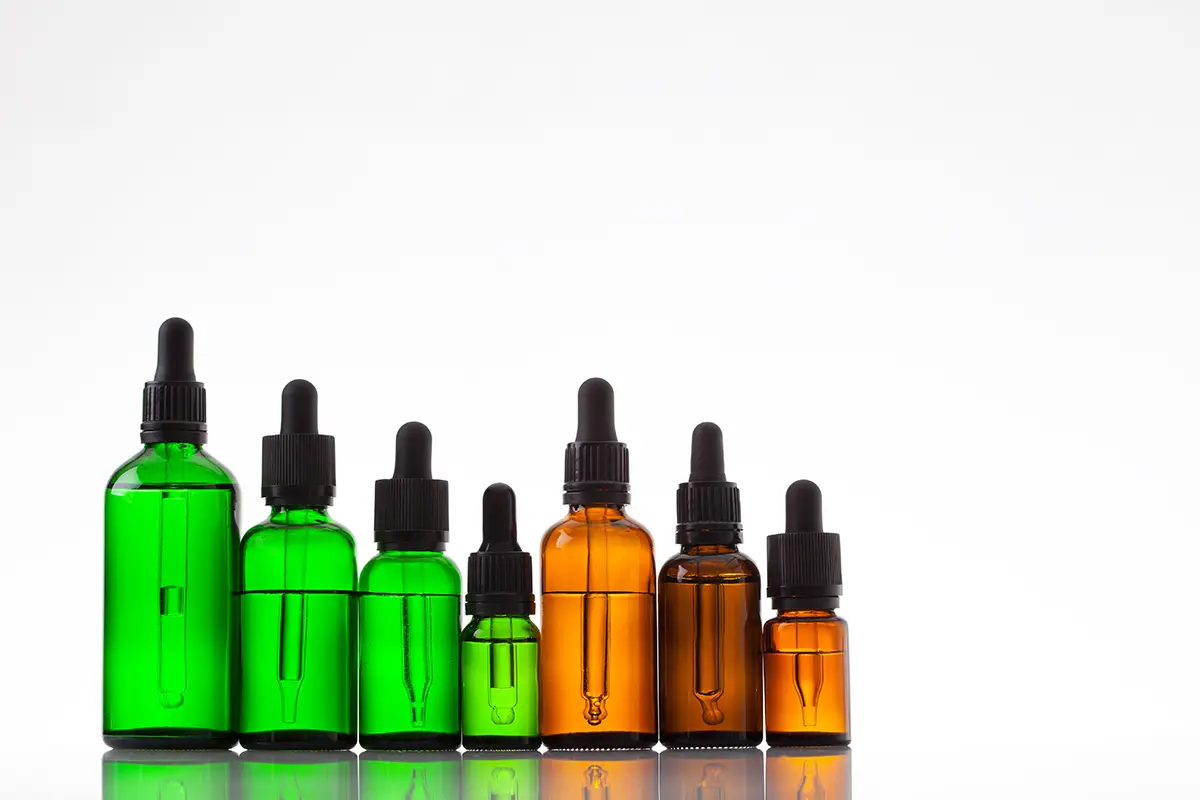
Using Myrrh essential oil safely
It’s important to note that Myrrh should never be taken orally as it can be toxic in large doses. To use topically, dilute Myrrh oil with a carrier oil such as Almond or Jojoba before applying directly to the skin. You can also incorporate it into your own creams and lotions. Always follow suppliers’ advice or seek the advice of a professional aromatherapist.
Always buy your Myrrh oil from a reputable supplier who can give you supporting documentation. Anyone buying essential oils should be aware that some MLM companies’ agents work on commission. Many of these agents are not professional essential oil trained and may give dangerous recommendations. We do not recommend ingesting essential oils.
Keep in mind that if you know you have sensitive skin or may get an allergic reaction, you should do a small patch test first, 24 hours earlier. If this applies to you, do the same with all other essential oils, including citrus essential oils.
Final Thoughts
In conclusion, myrrh essential oil has a long history of use in traditional medicine and is prized for its many potential health benefits. It is known for its ability to support healthy skin and may also have anti-inflammatory, antimicrobial, and antifungal properties. Myrrh essential oil can be used in various ways, including aromatherapy, skin care products, and natural remedies. By incorporating myrrh essential oil into your wellness routine, you can support your overall health and well-being.


